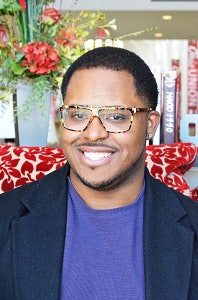Flights
One of the most dynamic actions you can take to ensure an inclusive experience for candidates is to allow them to fly their airline of choice. Not all airlines are created equal and as such, certain airlines may be more comfortable for fat candidates to fly than others. To be clear, I use the term “comfortable” loosely. One might say that travel is uncomfortable for everyone, which may be true. However, sitting in a middle seat and simply not having an arm rest is a bit different than not being able to comfortably put an armrest down or dealing with the violence of passengers who do not want to sit next to you because of your size. To sit with your body compressed and collapsed on itself, smashed against a window, thighs pressed tight together, knots in your back and arms locked across your chest; cramping and growing increasingly anxious over the several hour flight – plus connections – is what some of us experience right before arriving to your campus.
 Terah J. Stewart
Terah J. Stewart
In addition, each airline has a different passenger-of-size policy. What this means is there are some passengers who will physically not fit in or on one seat, and therefore they may need an additional or premium seat. The most inclusive thing you could do would be to cover that cost for your candidates, however, I realize that travel and auxiliary budgets continue to be strained. The next most inclusive thing you can do is to avoid buying the cheapest most restrictive ticket for your candidates. For many of us, traveling to your campus for an interview will mean we will still spend additional money to either buy an extra seat or upgrade the seat we have. It is impossible to do this if the administrative assistant or travel agent purchases the cheapest and most restrictive ticket.
I participated in an on-campus interview and I could not upgrade the ticket and could not buy an extra seat because there were not two seats still available next to each other. The only option I received from the airline – which was not my preferred airline – was to pay $40 to be pre-assigned to an aisle seat. Otherwise I would have been assigned a center seat I could not fit in.
Scheduling
When we are invited to campus, we realize that there are lots of folks with vested interests in our candidacy. This usually amounts to day-long interviews from 8 or 9 in the morning until 5 p.m. I think many – if not all of us – have come to expect this from the process, however we can make better decisions to be inclusive in our practices. For instance, rather than parading a candidate all over campus to meet various interested partners and parties, consider inviting those folks who have a vested interest to come to the candidate in a room or building that they do not have to leave instead.
Personally, I do not feel that I offer my best self when I am moved from place to place on campuses with various different terrains – some very hilly – and various elements/weather. I sometimes tire, become out of breath, and consequently overwhelmed. It is hard to center yourself when you have meetings, interviews, presentations, every hour of the on-campus visit. If you must have a candidate travel, give them a few minutes before each meeting to center, catch their breath, and collect themselves before running them into a room to start one more meeting or meet and greet. Notify those in that upcoming meeting that you are giving the candidate a few minutes for that purpose
To be clear, I am not suggesting that all persons of size are winded by walking back and forth on an interview day. However, some can be. Additionally, if we can schedule and implement inclusive practices – some of which I mention above – we center multiple people and communities who might need or benefit from them which can include introverted candidates, physically disabled folks and folks with mobility issues including senior candidates, and candidates with various types of anxiety disorders and diagnoses. It’s always best to ask a candidate what they need and what would be most helpful to them.
Space
Finally interview spaces and the furniture within them can also create difficult experiences for fat people on job interviews. Imagine walking into a conference room or being escorted to your booth for a lunch meeting and being anxious about the type of chairs and tables that will be available for you to sit in. I struggle with chairs that have arms that do not move or “give” when you sit in them. Dining booths that frame a table – bolted to the floor – is incredibly uncomfortable for me. I struggle to maintain focus and attention to the conversation at hand when I struggle to breathe and eat my meal.
So what?
If any of the examples I have shared surprise you, it simply means that fatphobia is working. It means that you likely have the privilege – as a thin(er) or straight-size person – to benefit from a thin-centric reality that adversely affects so many of us. At the core of the issue I raise is that fat bodies, as they exist, are non-normative, and through the friction of being not “normal” there is a level of bias attached to the experiences fat people have. Authors and educators Rod Michalko and Tanya Titchkosky discuss this idea of the “misfortune of disability”, which connect to body politics particularly through this pervasive idea that disability is “not natural” and in fact the “natural-gone-wrong” which is violent. I parallel this concept to that of fatness. What does it mean for fat bodies to not fit? What would it mean to approach our recruiting practices with this reality in mind? We must avoid perpetuating the belief that fatness is at best a choice, or at worst a misfortune. This thinking maintains the violence that fat bodies are not the way bodies are supposed to be and as such our experiences are unfortunate, but not justice issues.
As we gear up for another job search/candidate search season, I urge us to consider the ways we intentionally or unintentionally create difficult interview experiences for persons of size. Some of us do wonderful inclusive recruiting work and I challenge all of us to take a step toward making the next search process you participate in, size inclusive.
Terah J. Stewart is a doctoral candidate in the College Student Affairs Administration at the University of Georgia.















